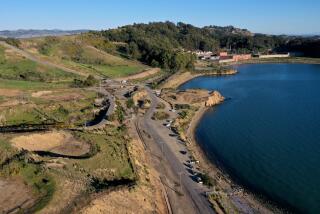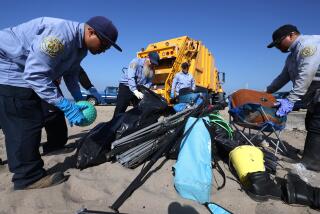A Farewell Wave to Beach Life
- Share via
Rolly Pulaski plans to take in one long, last view of the Pacific on Tuesday as he and his neighbors prepare to leave El Morro Village beachfront mobile home park.
“Come by on the 28th; we’ll be saying goodbye to the last sunset,” said Pulaski, who fondly recalled many a late afternoon sitting on his hilltop terrace with his wife, Madine, who died last year. “From our favorite alcove we saw whales, hawks flying by, even a bobcat once.”
By midnight Tuesday, the remaining residents of this community north of Laguna Beach say, they plan to be gone, sticking to an agreement that ends one of the state’s longest-running battles over public beaches.
For 26 years after the state acquired the land for the public, residents hung on with hopes for one more summer, one more sunset. There were lawsuits, legislative hearings, hot tempers and pleas for more time. Now the last days are at hand for 200-plus tenants.
By fall, state officials say, work should be underway on developing a campground, RV park and beach accessible to all. The area is part of Crystal Cove State Park, which stretches 3.5 miles from Laguna to Corona del Mar.
“We understand the tenants, and they’re in a grieving process,” said park Supt. Ken Kramer. “But there are no more outstanding issues at the village. So come March 1, the state takes responsibility for the park.”
For residents, their departure marks the end of an era. For decades, this enclave in Crystal Cove State Park has served as a vacation refuge for some and a full-time home for others.
Some families, such as the Stevens-Heflin clan, go back four generations. They and others helped create the park’s sense of community, where campfires, volleyball matches and laid-back weekend potlucks reflected a beach way of life.
Before he leaves the park, Gabe Heflin, 28, who grew up there, plans to shake hands with as many residents as he can before midnight Tuesday. “I’m planning on spending as much of my time as I can with all my old friends,” he said.
“It’s a piece of history that’s being lost here,” said filmmaker Michael Spencer Taylor, a permanent resident working on a documentary about life at El Morro in its final year as a mobile home park.
“I would call it the death of a community,” said attorney Gerald Klein, who represented the residents in their Superior Court battles. “It’s one of the oldest communities in Orange County where people really treated each other as neighbors.”
The land was owned by the Irvine Co., which in 1927 leased a portion of the area where the mobile home park now lies to a businessman who sold propane to coastal farmers. That’s according to an excerpt from the coming book “A California Woman’s Story,” by heiress Joan Irvine Smith.
It was then called Tyrone’s Camp, and the proprietor put in a restroom and a market that sold abalone from nearby Abalone Point.
Trailers replaced tent camping in the 1940s. In 1954, it was renamed El Morro Trailer park.
Tenants rented their sites month to month from what is now the Irvine Co. until the state bought the land for $32.5 million in 1979 and turned it into a park. The state offered residents 20-year leases that were extended for five years in 1999.
Even by that deadline, residents didn’t move out. They hired attorneys, offered to pay higher rents and backed a local assemblyman’s bills to prevent their eviction -- all to no avail.
On Wednesday, the state plans to close the mobile home park, shutting off utilities to ensure that no electric or gas lines cause a problem, Kramer said.
A contractor will be hired to salvage items of value from the remaining 250 mobile homes, such as old brick and furnishings.
“Any value left in the mobile homes will be sold to offset the state’s cost to remove the mobile homes,” he said.
Parts or all of the trailer park will then be demolished, including foundations, restrooms and pavement and debris removed, he said. Construction of the public campground is not planned to begin until next year.
“Unfortunately, the delay dealing with litigation has forced us to delay our construction by 24 months,” Kramer said. “We hope to launch the bidding for the construction at the end of summer.”
Many residents, such as Judy Wallace, 66, have had a family trailer at El Morro for more than six decades. Recently, she stood outside her trailer reminiscing about spending summers with her two boys and looking at a collection of sunbaked seashells and driftwood -- souvenirs of summers past.
Since the 1930s, Wallace’s family has had a stake here. Her father, Bert Francis of Upland, liked to fish, and camped out on the sandy beach, then bought an old travel trailer and parked it there.
After she married John Wallace, also from Upland, where they have a home, they bought a share in the family mobile home in the early 1960s.
Rent, which has climbed to $300 to $700 a month, was $25 then. They moved from a beachfront trailer to a trailer inland of Pacific Coast Highway.
Their trailer is simply outfitted. No high-end refrigerator or marble countertops here, like one beachfront trailer that sold for $225,000 four years ago.
For John Wallace, 69, a retired football coach at Montclair High School, the trailer park is where he taught his sons how to bodyboard, fry fish and catch grunion.
“Our kids learned you don’t get grunion by sitting at a warm campfire and pointing a flashlight at the surf,” he said. “ This has been a great place. All our kids bodysurfed; we even had our granddaughter bodysurfing here.”
But not all are saddened by the residents’ departure.
When the Irvine Co. sold Crystal Cove to the state, the intent was to make the property a public park, said environmental groups and Smith, a former company board member. Smith said it was her family’s wish to ensure that a piece of the county’s coastline remain forever open to the public.
When told El Morro residents were leaving, she said, “This is wonderful news. The entire park was to be a benefit of the people ... to be preserved, protected and made accessible to all.”
*
(BEGIN TEXT OF INFOBOX)
Moving deadline
Chronology
1979: The Irvine Co. sells the state a swath of land, including the trailer park site, for a future state park. Many mobile home residents sign 20-year leases.
1982: The state approves a General Plan to convert the trailer park to public recreational use.
1999: Residents are given five-year lease extensions.
Nov. 2004: Residents file two lawsuits to bar the state from evicting them. Both are denied.
Dec. 31, 2004: The lease extensions expire.
Jan. 20, 2005: The eviction process begins.
March 1, 2006: Deadline for residents to have left the grounds.
*
Source: California Department of Parks and Recreation
More to Read
Sign up for The Wild
We’ll help you find the best places to hike, bike and run, as well as the perfect silent spots for meditation and yoga.
You may occasionally receive promotional content from the Los Angeles Times.






